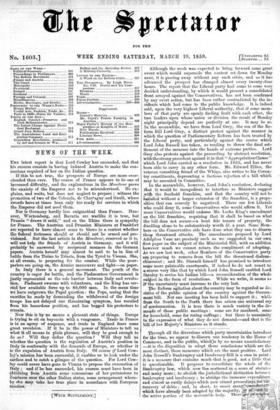Although the week was expected to bring forward some great
event which would supersede the contest set down for Monday next, it is passing away without any such crisis, and as it has advanced the prospect has changed almost every twenty-four hours. The report that the Liberal party had come to some very decided understanding, by which it would present a consolidated front arrayed against the Conservatives, has not been confirmed by any overt action, but has been rather contradicted by the in- cidents which had come to the public knowledge. It is indeed said, upon the very highest Liberal authority, that if some mem- bers of that party are openly finding fault with each other, the two leaders upon whose union or division the result of Monday night principally depend are perfectly at one. It may be so. In the meanwhile, we have from Lord Grey, the son of the Re- form Bill Lord Grey, a distinct protest against the manner in which the question of Parliamentary Reform has been treated by the Liberal party, and particularly against the course which Lord John Russell has taken, as tending to throw the final set- tlement of the measure into the hands of extreme parties. Lord Grey also protests against the proceeding by abstract resolution, with the strong precedent against it in that " Appropriation Clause " which Lord John carried as a resolution in 1835, and has never been able to carry in any other form. Mr. Edward Ellice, the veteran consulting friend of the Whigs, also writes to his Coven- try constituents, deprecating a factious rejection of a bill which may be amended in Committee.
In the meanwhile, however, Lord John's resolution, declaring that it would be inexpedient to interfere as Ministers suggest with the freehold franchise, and that the country will not be latisfied without a larger extension of the franchise, is a propo- sition that can scarcely be negatived. There are few Liberals who could deny it, some Conservatives who would affirm it. Yet more' Conservatives would endorse Mr. Locke King's amendment on the 101. franchise, requiring that it shall be based on what the bill does not secure—a bowl fide tenure of property, the
dwelling alone to be substantively worth Si. a year. Some Mem- bers on the Conservative side have done what they can to disarm
they threatened attacks. The amendments proposed by Lord Adolphus Vane are precisely such as we suggested in our own. first paper on the subject of the Ministerial Bill, with an addition however much we cannot return the compliment of adopting.
As we saw last week, other Members of the Conservative party arc preparing to remove from the bill the threatened disfran- chisement ; and Mr. Disraeli himself has promised to introduce some more palateable enactments, if indeed ho do not resort to eourse very like that by which Lord John Russell enabled Lord Stanley to revise his Indian bill—a reconsideration of the whole subject in the form of resolutions. While we write, it seems as if the uncertainty must increase to the very last.
The Reform agitation about the country may be regarded as de- cisive of the public opinion of the country against the Govern- ment bill. Not one meeting has been held to support it ; while from the South to the North there has arisen one universal cry of condemnation. It is true there is much variety in the de- mands of these public meetings ; some are for manhood, some for household, some for rating suffrage ; but there is unanimity in the expression of what they do not demand—and that is the bill of her Majesty's Ministers as it stands.


































